Guinea pigs love to eat more and more, which leads to concern that overeating of guinea pigs can be the cause of the life-threatening condition. But can guinea pigs die from eating too much? I did a thorough research about this and here is what I have learned.
Guinea pigs have a susceptible digestive system. Overeating can cause digestive problems and obesity, which can be life-threatening. Hay can be served in unlimited quantities. However, excess feeding of vegetables, pellets, and fruits can lead to severe health issues like diarrhea, urinary problems, etc.
A guinea pig’s diet should contain 85% grass hay followed by a cup of vegetables and a small serving of pellets. Fruits and other treats can be served occasionally but those should never be a part of their daily diet.
Guinea pigs can end up overeating if they are provided with excess fruits and vegetables. However, it is terrible for their health.
Thus, we must learn what food can be served to them and what quantity to take good care of our guinea pigs. So, let’s learn all about it.
Can you overfeed a guinea pig?
Guinea pigs are herbivores creatures. If they will get a chance to eat food they will eat enough. If they are given a choice, they will likely prefer to eat the highest-calorie items and leave the healthy ones.
It all depends on evolutionary alteration. Guinea pigs have grown to survive on a diet of hay, which is low in calories and highly nutritious.
Guinea pigs who live in the wild, eat grass daily to consume enough calories to continue. Hence, guinea pigs take advantage when they find those food items which have a lot of nutrients. They widely search and look for the most high-calorie food items.
Domestic guinea pigs should mainly eat grass hay, with some green vegetables offered from time to time. But if they have a chance, they will overeat on fruits, vegetables, pellets, and other food items.
What happens if your guinea pig eats too much
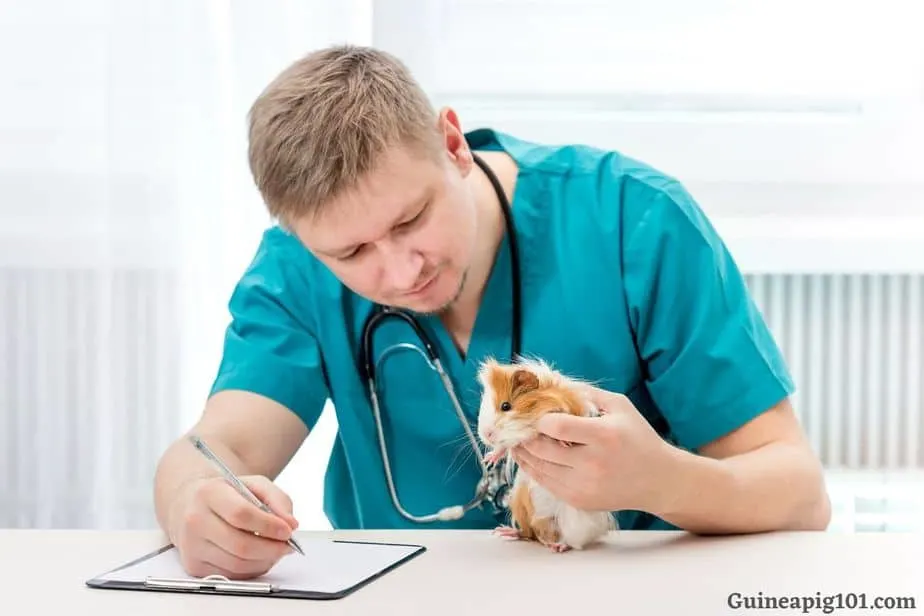
Various things can happen if your guinea pig is given a chance to overeat. These are the most common issues that will occur:
- Gastrointestinal stasis (GI): From this condition, the guinea pig’s digestive system will completely close down and cause a life-threatening situation. Guinea pigs need the right balance of protein, fiber, and carbohydrate in their diet. The risk of Gastrointestinal stasis will increase rapidly if the balance is wrong.
- Tooth decay: Teeth decomposition can be caused by overeating high-sugary items such as apples and blueberries.
- Heart problems: Guinea pigs can develop congestive heart failure, which can cause a life-threatening condition. They can also establish other heart and blood vessel disease problems, like, for example, atherosclerosis.
- Obesity: Guinea pigs will get fat if they consume too many calories. It is hard for overweight guinea pigs to be active around and prepare themselves.
- Urinary tract problems: If the diet of a guinea pig is having too much of calcium items, then Urinary tract problems can develop. The first sign of a urinary area infection is colorless or cloudy urine (bladder sludge).
- Imbalance of gut bacteria: Consuming too many sugary items can cause an imbalance of stomach bacteria. Also, diarrhea or constipation can be caused by this.
Can guinea pigs eat too much grass
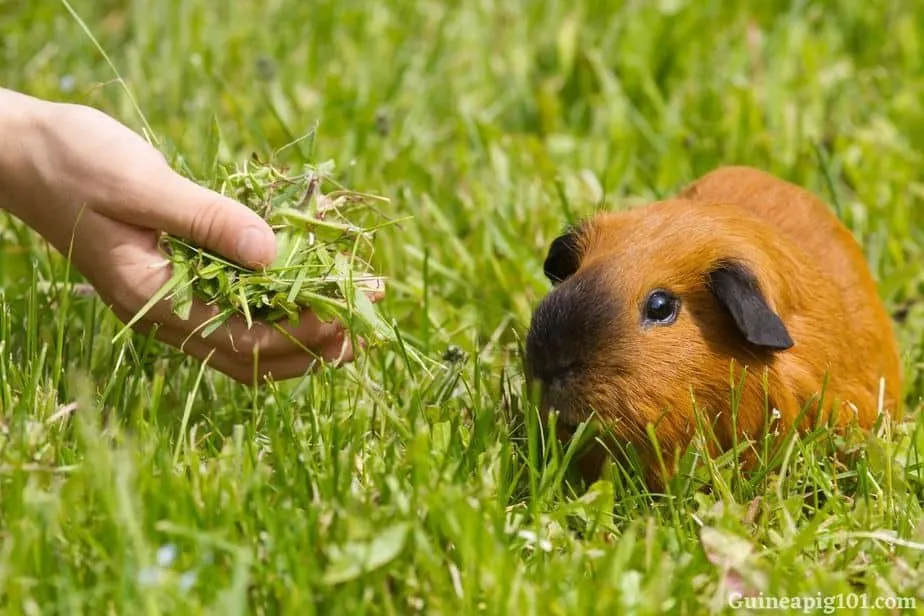
Guinea pigs can indeed overeat grass if they are provided with an opportunity to do so. Because the fresh grass provided to the guinea pigs is in much quantity, the stomach of the guinea pig becomes full by eating too much grass.
When your guinea pig eats enough of grass, at that moment, they stop consuming.
However, eating excess grass is not suitable for your guinea pig’s health because if they eat more grass, their poop will become more sticky.
The owner needs to provide fresh grass in a small quantity to their guinea pig. Otherwise, the digestive system of your guinea pig will become upset.
Also, you can add some vegetables and grass to your guinea pig to provide nutrition in their diet.
Can guinea pigs eat too much vegetable
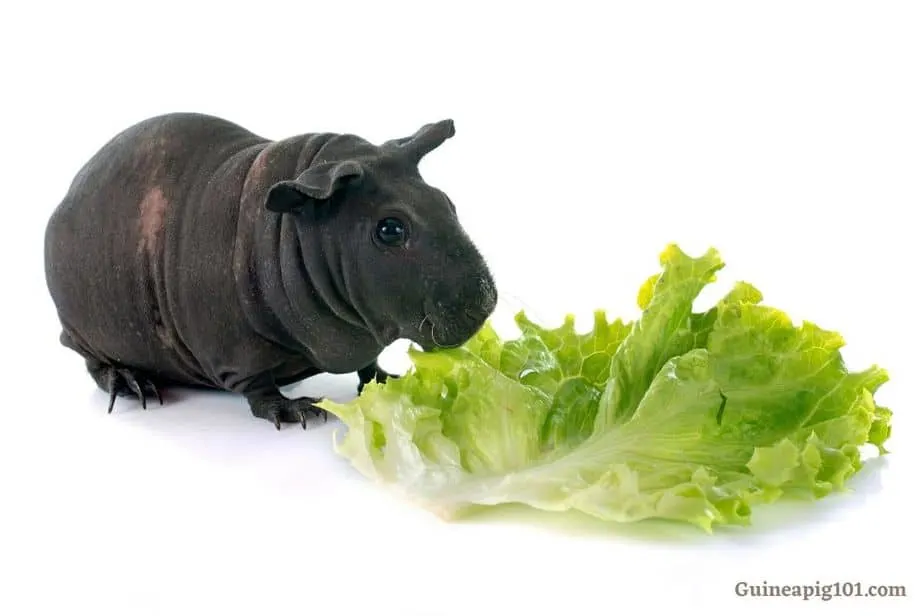
Vegetables are a significant part of guinea pig’s diet, but overeating can cause health problems. The owner needs to provide only a cup of fresh vegetables per day.
Some vegetables are safe for your guinea pig includes cauliflower, asparagus, cabbage, corn on the cob, cucumber, green bean, snap peas, parsley, cilantro, spinach, squash, tomatoes, red pepper, and lettuce.
You can also give carrots to your guinea pig, but they are sugary and should be provided as a treat to them.
Guinea pigs can even eat broccoli, but they are high in vitamin c and oxalates, so the owner should provide this in a small quantity, and only a couple of times a week.
Can guinea pigs eat too much lettuce
Lettuce comes quickly into your mind when you think of guinea pig food. But many of the owners do not realize that some specific kinds of lettuce are not good for guinea pigs.
Dark green lettuce is the only one that guinea pigs should eat like, for example, romaine lettuce. Light-colored lettuce contains a large amount of water content and has little nutritional quality.
Some kinds of lettuces, for example, iceberg, contain a mixture called lactucarium, which is very harmful to guinea pigs.
Can guinea pigs eat too much hay
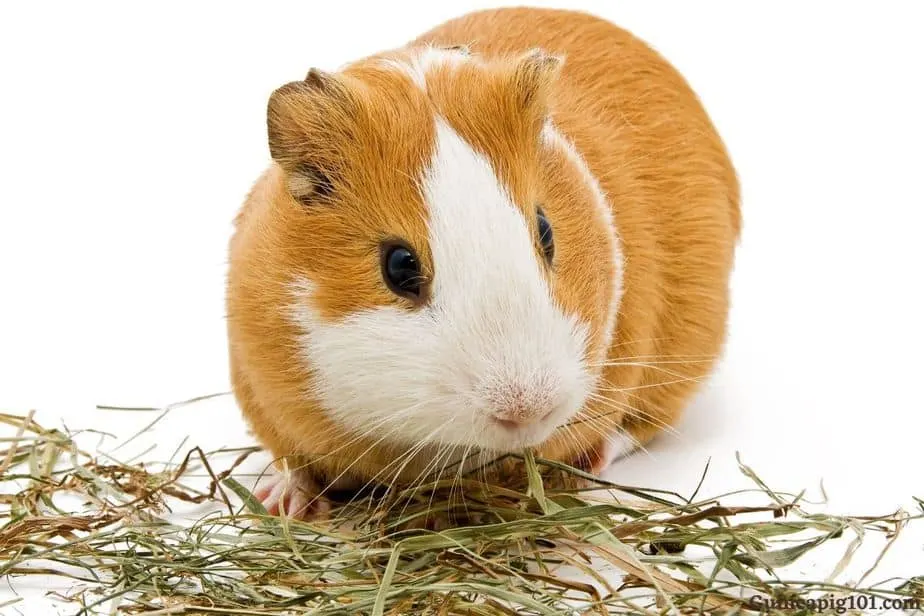
Wild guinea pigs(capybara) spend their entire life by eating grass. They build their homes in the grasslands and fields and want an unlimited amount of their primary food source.
However, domestic guinea pigs spend most of their time inside the house. While the owner can grow hay grass for their guinea pig, for a change.
Your guinea pig will get the same nutritional benefits from commercial hay and this can be obtained in bulk.
The owner should provide unlimited grass hay for their guinea pigs to eat. The most popular feed is:
- Orchard hay: This is made from dried orchard grass, or else known as cat grass. It has the same nutritional values, just like timothy hay.
- Timothy hay: This is made from dried timothy-grass.
- Meadow hay: This is a collective term for a variety of different grass hays. Maybe, it can have different nutritional value and can be rarely lower in quality.
The owner can also give wheat, oat, and barley hay to feed their guinea pig.
Alfalfa hay should be only provided to those guinea pigs who are younger than 6 months otherwise avoid them as it contains an excess amount of calcium and protein in it.
The teeth of guinea pigs grow frequently. Eating hay can help them to keep their teeth short. Their teeth need to be trimmed by the veterinary surgeon if guinea pigs could not eat enough hay.
Hay provides beneficial dietary fiber. Also, it is essential to make sure that their digestive system is working correctly. Less amount of hay can cause GI stasis.
Can guinea pigs just eat pellets
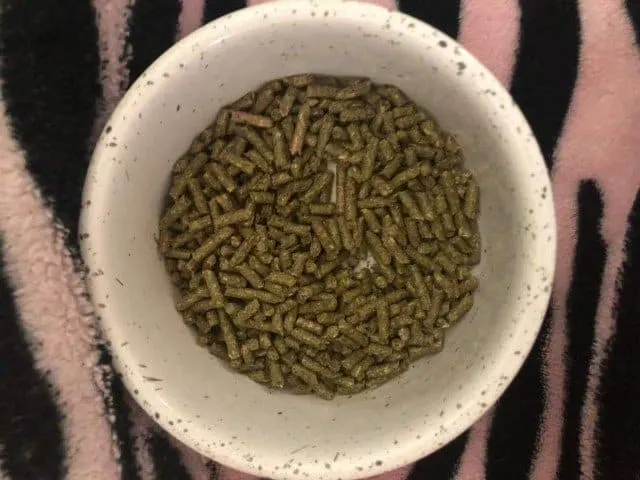
Pellets of guinea pig food are made from processed, dried, and compressed hay. But they are not an essential part of guinea pig’s diet. Only fresh vegetables and hay are the items, on which guinea pigs can happily live on.
But, some of them do not eat enough hay. You can also increase your guinea pig’s diet with pellets if you are worried that they are not getting enough fiber or Vitamin C.
You should need to look for a good-quality pellet, which is mainly made from timothy grass meal.
It should not contain animal fat and includes only 14% protein. You need to make sure that there are no seeds, corn calorie-dense nuts, or colored pieces mixed in the pellets.
Give a 1/8 cup of pellets every day to an adult guinea pig. Younger guinea pigs can be served a little more as they need those extra minerals for growth. However, serving more than this can cause health problems, like obesity and kidney diseases.
How much food should a guinea pig have a day?
Guinea pigs of every age should have to obtain unlimited grass hay. You can provide alfalfa hay to those guinea pigs who are under one year old. As, it is very much high in protein for older guinea pigs, and can cause unnecessary weight gain.
85% of hay should be in the guinea pig’s diet. On average a guinea pig can eat anywhere around 90-100 grams of hay every day.
Around 15% of fresh vegetables and periodic fruits should be included in the rest of the guinea pigs’ diet. And these are:
- Non-leafy vegetables: Maximum 15% of fresh food should be non-leafy vegetables, such as carrots, radishes, parsnips, bell peppers, beets, and snow peas.
- Leafy greens: Three-quarters of leafy greens should be given as fresh food to your guinea pig. For example, bok choy, arugula, cilantro, dandelion greens, dark-leaf lettuce, and carrot tops.
- Fruits: Strawberries, apples, and bananas should be allowed occasionally. Give the fruits as much as a teaspoon can hold per serving.
Daily offer your guinea pig a portion of fresh vegetables about twice of their head size. That should contain at least four different types of green vegetables.
Provide the new vegetables slowly, to avoid the digestive system problems of your guinea pig.
A healthy guinea pig feeding schedule consists of providing one fresh meal in the night, and one in the morning.
Try not to give a large serving of brassica vegetables, such as broccoli, kale, cabbage, and cauliflower, to your guinea pig. They should only serve at once in a week.
Why are guinea pigs always hungry?
The new owners will be shocked by guinea pigs as they eat so much and how hungry they are. Your guinea pig can spend most of their time, from morning to evening by eating hay.
Even while sleeping, they will periodically wake up to consume some hay, and then go back to sleep. Most guinea pigs will immediately attain fruits, vegetables, and pellets that you give to them.
There is no need to worry if your guinea pig is suddenly eating more than usual. It is very much standard for your guinea pigs’ hunger to get larger over time. As by growing or getting older, they develop more and more craving.
When guinea pigs are molting, then also they eat more, which happens 1-2 times every year. Even if they start exercising more than average, then also guinea pigs want to consume more. Those guinea pigs who are pregnant, they also eat more food than they usually do.
It will be fine if you don’t overfeed your guinea pig for longer or offer new foods too instantly.
When your guinea pig stops eating enough food, it could be a sign of GI stasis, which is a life-threatening situation. Mostly, no appetite is always a sign of health problems.
Sources: Diet Composition and Mineral Balance in Guinea Pigs, Molar Teeth and Investing Tissues of Normal Guinea Pigs, Dietary Vitamin C, and Vitamin E needs of Guinea Pig, Vitamin C needs of our guinea-pig, Timothy hay, Hay, Nutrition in timothy hay
